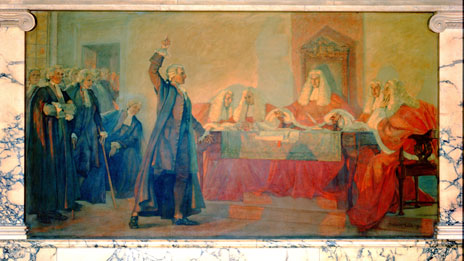New Bedford Standard Times: Otis’ fiery speech a clarion call to teachers
This op-ed originally appeared in The Lowell Sun, Worcester Telegram & Gazette, Fitchburg Sentinel & Enterprise, and the New Bedford Standard Times.
By Jamie Gass
Jamie Gass directs the Center for School Reform at Pioneer Institute, a Boston-based think tank.
July 04, 2013 7:20 AM
After witnessing the speech “Against the Writs of Assistance,” Massachusetts revolutionary John Adams wrote: “James Otis was a flame of fire; with … classical allusions, a depth of research, a rapid summary of historical events and dates, a profusion of legal authorities, a prophetic glance of his eyes into futurity. … American Independence was then and there born.”
In our Statehouse, front and center above the stairway directly facing the offices of the governor, Senate president, and speaker of the House, sits Robert Reid’s massive 1901 mural portraying James Otis and the famous scene Adams described.
It is a story of our country’s early struggle for political independence, but is anyone teaching it to our schoolchildren?
Sadly, U.S. history and civics scores on the 2010 “nation’s report card” were abysmal; the average 12th-grade score is largely unchanged since 1994. And Massachusetts education officials have been derelict in giving U.S. history its appropriate place in our K-12 public schools.
The eldest of 13 children, James Otis Jr. was born in the remote Great Marshes of West Barnstable on Cape Cod. He came from a family of loyal and public-spirited colonial subjects. Otis’s father was a lawyer, judge and colonel in the local militia.
Otis graduated from Harvard College and cultivated his passion for ancient and English verse by authoring two booklets analyzing Greek and Latin prose and poetry. The latter was used as a textbook at his alma mater. Otis studied with a prominent Boston lawyer and, after marrying the daughter of a loyalist Boston merchant, seemed destined for a flourishing legal career and happy life.
But by February 1761, Otis became increasingly irritated about the legal abuses and arbitrary use of clerical power by the British Crown, Parliament and its colonial officials. As Great Britain sought additional colonial revenues for its mounting imperial costs, it enforced obscure provisions of its Navigational Acts with Writs of Assistance.
Chafing under these Writs’ authority to allow Britain’s petty bureaucrats to enter colonists’ homes and shops to search and seize taxable goods, Otis delivered a brilliant, five-hour-long oration at the Old Towne House in downtown Boston.
James Otis thundered at British officials: “I will to my dying day oppose, with all the powers and faculties God has given me, all such instruments of slavery on the one hand and villainy on the other, as this Writ of Assistance is … by this writ not only deputies, … but even their menial servants, are allowed to lord it over us. What is this but to have the curse of Canaan with a witness on us: to be the servants of servants, the most despicable of God’s creation?”
Otis’ fiery oratory was included in historian Diane Ravitch’s “The American Reader: Words That Moved a Nation,” an excellent 1990s school primer of American history speeches, prose and verse, which garnered high praise from the late American Federation of Teachers President Al Shanker and K-12 standards expert E.D. Hirsch, Jr.
Today, history instruction has few champions, either in Massachusetts or nationally. Passing a basic U.S. history MCAS test had long been scheduled to become a high school graduation requirement for the class of 2012, but in 2009, the Patrick administration retreated.
By 1769, pre-revolutionary excitement was straining James Otis’ already fraying mind and nerves. After authoring a newspaper essay lampooning British customs commissioners, he was viciously attacked in a Boston coffee-house and his head severely lacerated by the cane and sword of an offended commissioner.
Struggling with weakened health, mental illness and never fully regaining his keen intellectual powers, the 44-year-old Otis spiraled for 14 years before living at a friend’s farm in Andover, where he was struck by lightning and killed in 1783.
He’s entombed in obscurity at Boston’s Granary Burying Ground.
America’s revolutionary generation sacrificed to secure our liberties. They went to war against the British Empire, the most powerful imperial force on earth in the 18th century, over violations to their fundamental rights and exorbitant taxation on their breakfast drink.
As we celebrate the Fourth of July and our republic’s sacred ideals, shouldn’t we return stories like James Otis’ to their rightful places in Massachusetts classrooms by reinstating the requirement that students pass a U.S. history MCAS test to graduate from high school?



